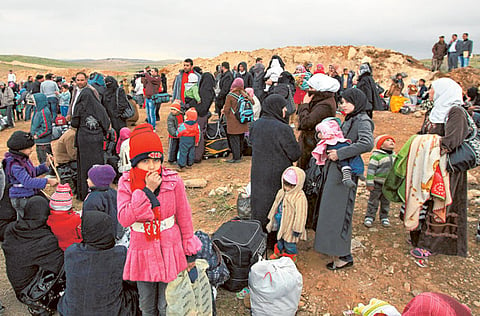Unicef facing a cash crunch over Syrian refugees
Camp services, water and vaccination programmes to be cut by the end of April

Dubai: Unless the international community follows through on a commitment to help hundreds of thousands of Syrian refugees, the United Nations will be forced to cut even the most basic services to refugee camps, Gulf News has learnt.
And Unicef — the United Nations Children’s Fund — says the cuts are coming by the end of April.
“There are 363,000 refugees that are in Jordan now after fleeing from various cities in Syria, literally for their lives,” Simon Ingram, the regional chief of communication of Unicef in Amman, Jordan, told Gulf News on Wednesday. “Half of these [refugees] are children.”
Last December, Unicef appealed to the international community for $195 million (Dh717 million). But few of the pledges given have materialised into cold hard cash – funds badly needed to keep services running for the desperate Syrian refugees in camps across the region. The $195 million was meant to cover costs of providing basic services for the refugees between January and June, 2013.
To date, Unicef has received just $54 million – a little over 20 per cent of the total needed.
Because the conflict in Syria has lasted for more than two years, it’s hard to keep the public focused on the need for funds.
But it’s crunch time now, and Unicef is becoming increasingly worried of the consequences for the refugees if it doesn’t receive the rest of the badly needed money.
“Lack of funding is the biggest problem we are facing,” Ingram told Gulf News. “We are in a situation where we will have to start cutting services because we just don’t have the money for them.”
Zaatari, the largest refugee camp in Jordan, is desperately in need of more funding.
Initially when the camp was set up, it was meant to accommodate 60,000. After nearly 10 months it is now bursting at the seams with 100,000 refugees – nearly an entire Syrian city in the little patch of desert – with about two to three thousand more coming in over the Jordanian border on most days.
The situation is the same in other camps set up in Iraq, Turkey and Lebanon to help Syrian refugees. There are an estimated 65,000 refugees living in Lebanon’s Bekaa Valley alone.
Unicef is helping run Zaatari camp by providing basic services such water distribution, education and immunisation campaigns.
In Syria a vaccination campaign run between Unicef with the help of the Arab Red Crescent, hopes to immunise
2.5 million children. But without $3 million needed to buy the vaccine and run the programme, that will cease.
Unicef also helps provide water for drinking, bathing and sanitary facilities. But the trucks that carry the water require $7.2 million dollars to run.
“Without this money, we won’t be able to pay the trucking company to transport clean water to the camps for the basic needs of these children,” Ingram told Gulf News.
Inside Syria the situation is even worse. Since the uprising began in March 2011, nearly 4 million people have been displaced – literally running for their lives as bombs blow their homes up behind them. Of those, 2 million are children that have been caught in the cross-fire, suffering from mental and physical injuries that are devastating.
“Children have literally seen war come to their doorsteps,” Ingram said. “Truly horrific things have happened to them. They’ve lost family and friends, loved ones right in front of them – this has affected them severely. There’s critical need for them to find some sense of normality.”
To try and ease children’s mental worries, Unicef has set up Child Friendly Spaces to find some calm in this chaos. These spaces are meant to provide support to children that have been displaced.
“It can be as simple as a tent,” Ingram said. “It’s supervised and safe, above all. They have staff that engage children in artwork and various activities that can get their minds away – even temporarily from what’s going on around them.”
— Maryam Mirza is an intern at Gulf News



